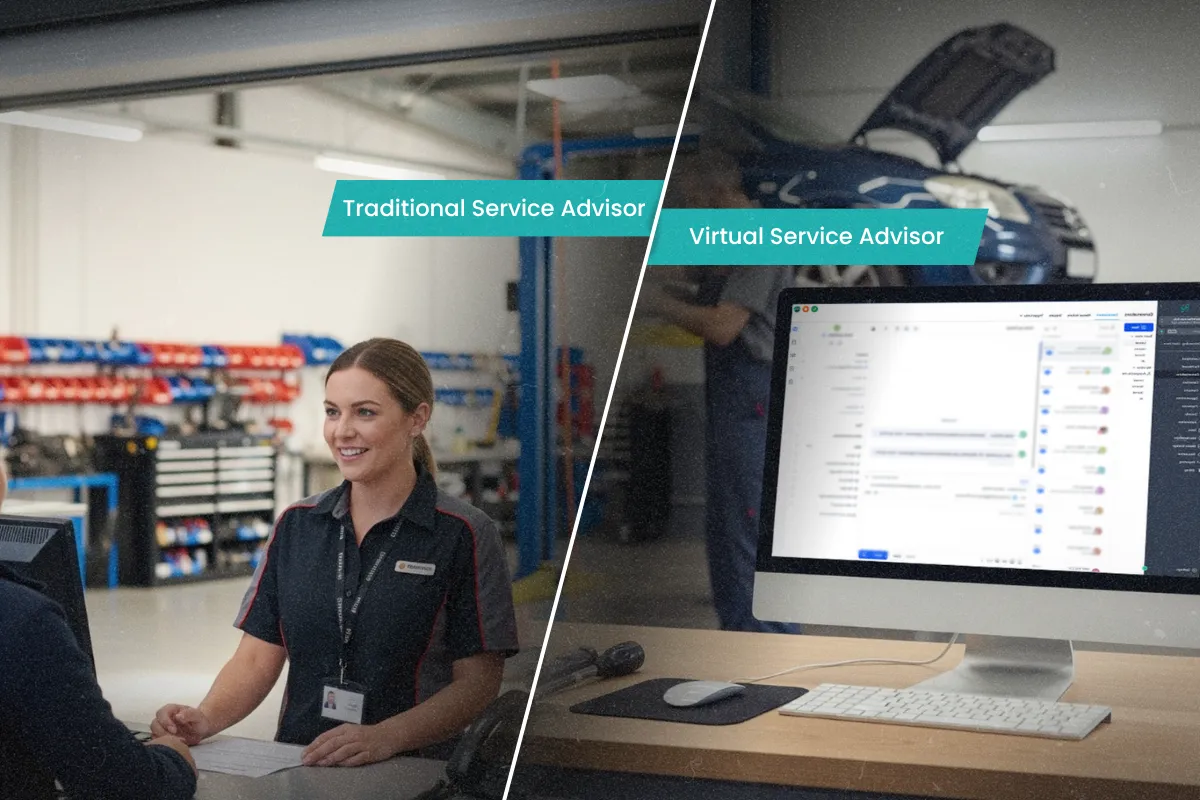
The Difference Between a Service Advisor and a Virtual Service Advisor (VSA)
Which One Is Right for Your Workshop?
After AutoCare 2025, it was clear that most people, even those in the industry, aren’t sure what separates a traditional service advisor from a Virtual Service Advisor (VSA). If you’re running a workshop, you might be wondering: do I need someone on the front desk, or can I get the same results (or better) with a VSA?
Let’s break it down.
What is a Service Advisor?
A Service Advisor is the person at the front desk, your customer’s first point of contact. They greet customers, listen to their concerns, translate those into clear instructions for your techs, and keep everyone in the loop. They’re the face of your business, handling bookings, quotes, upsells, and follow-ups.
Key strengths of an in-house service advisor:
Face-to-face rapport with customers
Can handle walk-ins and last-minute issues
Knows your team and workshop culture inside out

What is a Virtual Service Advisor (VSA)?
A VSA does almost everything a traditional service advisor does, but remotely. They’re trained in the same systems, know the industry, and can handle bookings, quotes, follow-ups, and even parts sourcing from anywhere. The difference? They focus on your admin, communication, and workflow tasks from a remote location, so your team can stay focused on the workshop floor.
Key strengths of a VSA:
Handles admin, bookings, and follow-ups without needing a desk in your shop
Can work flexible hours, covering busy periods or after-hours. Our VSA’s split their time over the day so they may do 15 minutes here then an hour later. Spreading the hours over the week so no need for a Full or Part time salary sitting with their thumbs being twiddled
Focuses on efficiency, no interruptions from walk-ins or phone calls at the counter
How Does It Work in Practice?
With a Service Advisor:
You get that personal touch, someone who knows your regulars, can read body language, and handle those tricky face-to-face conversations. They’re great for workshops with lots of walk-ins or where building in-person relationships is key.
With a VSA:
You get efficiency, flexibility, and cost savings. A VSA can handle all the admin, bookings, and follow-ups remotely, freeing up your techs and owners to focus on the workshop. They’re perfect for shops that want to scale, reduce admin headaches, or don’t have the space or budget for another staff member. You still check them in and say hello as that is what makes your workshop unique.
With Both:
Some workshops use a hybrid approach: the VSA handles all the quotes, job preparation, and admin behind the scenes, while the in-house service advisor focuses on face-to-face customer interactions and high-level or detailed estimates. This setup means your service advisor can give customers their full attention, while the VSA keeps the workflow moving and ensures nothing gets missed.
What About Customer Experience?
Here’s the truth:
Customers want fast, clear communication.
They want to know what’s happening with their car, and they want to feel looked after.
A good VSA can deliver this just as well as someone in-house, honestly sometimes even better, because they’re not distracted by the chaos of the front desk. With tools like pre-arrival forms, digital job cards, and automated updates, your customers get a seamless experience from booking to pick-up.
Why VSAs Often Quote Better Than In-House Service Advisors
One thing most workshops don’t realise: VSAs are often better at quoting jobs than traditional service advisors. Why? Because quoting isn’t just about plugging numbers into a system, it’s about accurately translating technician notes, understanding the job scope, and making sure nothing gets missed.
In-house service advisors are usually juggling a dozen things at once, phone calls, walk-ins, customer questions. Quoting can become rushed, or details can slip through the cracks. VSAs, on the other hand, are trained to focus on this process. They work from clear tech notes, follow structured quoting procedures, and have the time to double-check every estimate.
The result? More accurate quotes, fewer missed items, and a better margin for your workshop.
If you want your in-house advisor to focus on customer service and high-level estimates, let your VSA handle the quoting. You’ll see the difference in your workflow, and your bottom line.
Which Is Right for You?
If you’re drowning in admin, missing calls, or struggling to keep up with estimates or follow up’s, a VSA can be a game-changer.
If you have lots of walk-in traffic, an in-house advisor might be best.
If you want the best of both worlds, combine them, let your in-house team focus on customers, and let a VSA handle the admin and digital communication.
The Bottom Line
You don’t have to choose between great customer service and efficiency. Whether you go in-house, virtual, or a mix, the key is having someone dedicated to communication, workflow, and estimating. That’s how you get cars out the door faster, keep customers happy, and grow your bottom line.
Curious how a VSA could fit into your workshop?
Book a free session with us at Workwise Auto Solutions. We’ll show you how to streamline your workflow, boost your profits, and deliver the kind of customer service that keeps people coming back.
